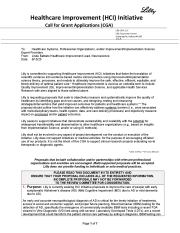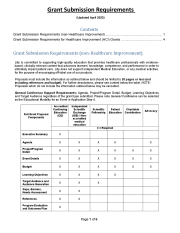Registration Deadline:
Event Contact:
More Information:
Explore other Industry Opportunities:
Lilly is requesting proposals that seek to objectively measure and systematically improve the quality of healthcare by identifying gaps and root causes, and designing, testing and measuring strategies/interventions that yield improved outcomes for patients and healthcare systems.
The proposal should outline how the initiative can effectively address systemic barriers (i.e., ones associated with multi-disciplinary teams, health system, data, and care delivery processes) and objectively measure impact on processes and/or patient outcomes.
Lilly seeks to support initiatives that demonstrate sustainability and scalability with the potential for widespread transferability and dissemination to other healthcare organizations (e.g., based on insights from Implementation Science, and/or or using IS methods).
Proposals that include collaboration and/or partnerships with relevant professional organizations and societies are encouraged. Multi-supported proposals will be accepted. Lilly does not provide funding to individuals or solo medical practices.
Purpose:
Lilly is currently seeking HCI Initiative proposals to improve the care of people with early symptomatic Alzheimer’s disease (AD) (Mild Cognitive Impairment (MCI) due to AD or mild dementia due to AD). An early and accurate neuropathological diagnosis of AD is critical for the timely initiation of treatments, access to social and economic support, and proper future planning. Blood biomarker (BBM) testing for the detection of AD, specifically the emergence of commercially available BBM tests including a recent FDA cleared In Vitro Diagnostic (IVD) test along with several Laboratory Developed Tests (LDTs), are a recent development that could transform the patient clinical care pathway by aiding in diagnosis. BBM testing can aid in the detection of AD pathophysiological hallmarks such as amyloid-beta deposition and tau pathology, As an adjunct to a full clinical evaluation, BBM tests have potential to accelerate a timely and accurate diagnosis of AD and appropriate referrals to specialists for further management. BBM testing is more accessible, less invasive, and more scalable than testing for CSF biomarkers; and have the potential to be more cost-effective than amyloid PET and CSF. , thus making BBM tests a promising option for simplifying the diagnostic process for both patients and HCPs. As most patients with cognitive symptoms first seek help in primary care, integrating validated BBM testing earlier into the clinical pathway may contribute to greater equity in healthcare access, a more accurate and timely diagnosis, and timely intervention.
Budget:
The total available budget related to this CGA is approximately $700,000. Multiple Individual initiatives of varying budget will be considered and evaluated and may be distributed among more than one provider. The amount Lilly will fund will depend upon the evaluation of the proposal and costs involved, and this amount will be stated clearly in a formal Letter of Agreement. Institutional overhead and indirect costs (“overhead”) may be included within the funding request. However, any included overhead should be kept to a minimum, may not exceed 30% of the total request, and may not cause the amount requested to exceed the budget limit set forth in the CGA. For institutions with actual overhead rates under 30%, do not increase the funding request to the maximum allowed. NOTE: Lilly Grant Office funding may not be used for entertainment, capital, gifts (monetary or otherwise), or personal travel. For associated HCI proposal budget submission, please see attached list of recommended financial components and include this documentation when you submit your proposal.
Qualification and Eligibility:
- Provide information on the qualifications and experience of the project leader and collaborators and include any certifications (i.e., Black Belt, Science of Improvement training, implementation science certification), recognitions (ex: Baldridge award) and the number and type of HCI projects you or your organization have successfully executed in the past.
- Provide a robust example of a past completed HCI project.
- Explain any methods that will be used to ensure those expected to participate are fully trained in the program expectations and any skills that may be needed to ensure effective execution of the project.
- If you are not in direct control of the data used for measurement, please provide letters of commitment from those with direct control of data indicating full support to participate and to supply data to measure baseline and outcomes measures in a timely manner.
- If you are not in direct control of the personnel and clinicians who will likely be involved in implementing changes, please provide letters of commitment to ensure their full and timely participation from appropriate leaders in your organization.
Mandatory Submission Instructions & Requirements:
- Please note – the only option for submitting HCI proposals in the portal is to select ‘QI.’ All types of HCI initiative proposals described in the intro to this CGA will be accepted under this option
- To ensure appropriate routing of your proposal – please ensure you select yes for the question “Is this grant in response to a CGA”
- Please limit the length of your proposal to 20 pages or less (not including references and budget).
- Please be prepared to provide progress and impact updates to Lilly at least quarterly, and to meet with Lilly and any other involved parties at initiative kick-off and closing (additional guidance to be shared with funded organizations/institutions)
For proposal application and portal questions, please contact Swapneeta Date, Vanderbilt Assistant Director of Life Sciences at swapneeta.date@vanderbilt.edu.
Please note: Faculty and researchers interested in applying for these opportunities based on technologies developed or disclosed at Vanderbilt must submit their proposals through the CTTC.

